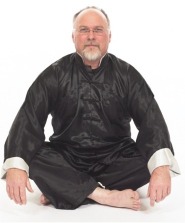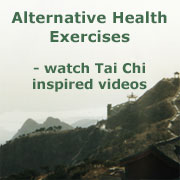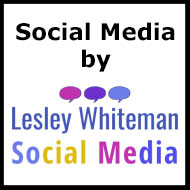Classes are now cancelled until Thursday 12 August
In the past 18 months we have become used to getting our socialising and our fitness classes online, but for many of us while this has been helpful, the online option does not work well, so now that things are opening up we are working our way tentatively out of the Covid experience and back into real world social activities.
As an aid to this reclaiming of face-to-face classes Shefford Tai Chi is offering a “first lesson free” taster session during the month of July at our regular classes in the town Community Hall – just turn up during July at any of our classes and mention this offer to claim your free session. Classes are held on Monday at 2.30, Thursday at 2.30 and Sunday at 6.30 each week – see here for details
New Thursday class
28/05/2021It is great to be back in the Shefford Community Hall once more after a winter of sub-zero temperatures with wind and rain outdoors on Digswell field! Thursday at 2.30 is a new class based on the classes established during Covid restrictions – so now there are two daytime classes available Monday and Thursday – both at 2.30
There is no need to book – simply turn up and enjoy relaxed Tai Chi movement with a session aimed at people “over 50” – an age when it makes sense to learn the skill of balance and movement so that you have it when you need it. Falls are a great problem in later life and Tai Chi is a great way to practice not falling!
We look forward to meeting new friends wearing warm loose clothing after lunch on Thursdays.
Study of Tai Chi – further expansion
25/05/2021After my last post I was asked to expand on each point – I hope these further notes are helpful.
Posture corrections – we encourage an upright posture sinking weight into the pelvis and allowing the head to float up as if supported from above. This is similar to the golden thread idea of other practices.
Easier movement – relax and move is a principle that means we can move more easily in our daily lives from washing up to shopping and gardening.
Falls prevention – we focus on balance and posture – the body awareness that we learn is coupled with relaxation which enables us to be more resilient in our movement and so reduce susceptibility to falls as was found by the World Health Organisation.
Relaxed and loose body – we practice repetitive soft movement exercises so that tension can be eased from our muscles and joints allowing greater mobility and improved posture
Tai Chi based exercises – using simple, soft and repetitive exercises using Tai Chi and Chi Kung principles we learn how to manage our internal energy so that easy movement can become our habit.
Simple Tai Chi form – using the Chen style Laojia form we learn the first part of this time-proven pattern as a means of understanding our body and developing many ways of moving
Mindfully movement – using our bodies in repetitive exercises enables us to study what is happening in our body and in our mind as we practice – we learn to observe and to notice so that we can learn how to look after ourselves
Meditation in movement – the use of patterns and regular practice leads us to develop a meditative state which is both calming and energising.
Movement for your daily life – Tai Chi is a time-proven practice of optimal body usage which carries over to normal actions in daily life, enabling easier movement and body control with improved strength and better management of long term conditions
Enhanced lifestyle – moving easier with a calm understanding can lead to improved lifestyle with more fun and less pain
Body and mind training – we work with our bodies and our minds in Tai Chi to study how we move so that we can learn how to move better all the time
Understand and develop your movement in simple English – the language of Tai Chi was originally Chinese, coming out of the Chinese culture – we are now able to understand this in simple English with the use of western models and linguistic conventions
Learn how to age gracefully – we have observed that Tai Chi practitioners retain their physical and mental capability into old age – something supported by movement science
Extend middle age mobility into old age – sport and movement science support the idea that Tai Chi practice – especially in a group environment – is a great way to stay confident and reduce vulnerability to falls in later life.
Feel safer, feel lighter, feel stronger, feel more confident – the repetitive practice of Tai Chi exercises and patterns allow our body to carry ourselves more easily, more resiliently and to exert strength more readily
Learn how to pay attention and learn by observation of your own body – by learning to study and observe our body we pay attention to what we are doing and how so that we can take care of ourselves as we age
Feel comfortable among like-minded people and learn with them – learning in a social group provides extra motivation and interaction which helps us to understand ourselves and others – it is fun and rewarding
Recover lost mobility – Tai Chi exercises have been found to help loosen movement when stress and tension have become ingrained and reduced mobility – soft, gentle repetitive exercises using Tai Chi principles encourage us to loosen and to re-align our bodies
Management of physical conditions eg Alzheimer’s, Parkinson’s etc. The practice of Tai Chi and associated exercises has been found to be beneficial in learning how to physically manage many long term conditions and to provide helpful emotional support
Learn to manage your body before you become vulnerable – we encourage people to learn the skill of movement before they need it – which is why we refer to “ over 50’s” classes. This gives a good period of time to learn Tai Chi movement before vulnerability becomes a problem
Learn how to look after yourself – the study of Tai Chi involves learning what works and what does not so that one can understand how to look after oneself in all respects
Learn how to take control of yourself – understand the link between intention and movement, so that one can more easily move from one to the other.
Tai Chi as an integrated part of a healthy lifestyle – by stimulating mind and body we learn to look after ourselves and so can create a healthy lifestyle
Tai Chi tools of working with body and mind – you bring the spirit. Tai Chi has collected many useful tools for human personal and social development including meditation, repetitive soft exercise, relationship models of internal and external interactions
Learning to balance the forces in your life – age, weight, personal interactions, social pressures, new technologies. The focus of Tai Chi on a relationship model allows us to understand our lives in terms of balancing forces in a dynamic way – keeping calm when we need to do so.
Dealing with change – physically and emotionally we are surrounded by change and can learn to adapt and change ourselves to accommodate the world around us. Tai Chi addresses this.
Accessing Eastern world models of Buddhism and Taoism. Tai Chi uses the mind and body calming of Buddhist style meditation to create a beneficial internal environment, which compliments the Taoist world model of Yin and Yang.
Connecting with the latest western science models and evidence – we learn to look for western science ideas and experiences that allow us to understand Tai Chi from a western perspective
Understanding how Newton’s laws of motion can be applied to turn a straight line into a curve and how equal and opposite action and reaction can be manipulated by yielding softly – physically and psychologically we prefer to move in straight lines but that often brings us into direct conflict with the world – so it is beneficial to learn how we can gracefully navigate around these obstacles.
Learn to use visualisation and metaphor in physical exercise – we use both visualisation and metaphor in Tai Chi practice as aids to transmitting concepts as well as enabling our minds and bodies to communicate better.
This is a bit of a strange post – I can’t say that anybody else will find all of this in their own Tai Chi study – but if I can then perhaps you can too.
Posture corrections
Easier movement
Falls prevention
Relaxed and loose body
Tai Chi based exercises
Simple Tai Chi form
Mindfully movement
Meditation in movement – the use of patterns and regular practice
Movement for your daily life
Enhanced lifestyle
Body and mind training
Understand and develop your movement in simple English
Learn how to age gracefully
Extend middle age mobility into old age
Feel safer, feel lighter, feel stronger, feel more confident
Learn how to pay attention and learn by observation of your own body
Feel comfortable among like-minded people and learn with them
Recover lost mobility
Management of physical conditions eg Alzheimer’s, Parkinson’s etc.
Learn to manage your body before you become vulnerable.
Learn how to look after yourself
Learn how to take control of yourself
Tai Chi as an integrated part of a healthy lifestyle
Tai Chi tools of working with body and mind – you bring the spirit
Learning to balance the forces in your life:
– age, weight, personal interactions, social pressures, new technologies,
Dealing with change
Accessing Eastern world models of Buddhism and Taoism
Connecting with the latest of western science models and evidence
Understanding how western science like Newton’s laws of motion can be applied to turn a straight line into a curve and how equal and opposite action and reaction can be manipulated by yielding softly
Learn to use visualisation and metaphor in physical exercise
I have been notified that classes can re-start in the Shefford Community Hall starting May 17th at 2.30 – there will then be no class on Thursday 20th but I am teaching at the Swiss Garden @ 10.00 ( please book with them ) – there will be a class on Sunday 23 at 6.30 then we can continue with regular weekly classes on Monday 2.30, Thursday 2.30 and Sunday 6.30pm
I look forward to seeing old friends!
All my best regards
Ian
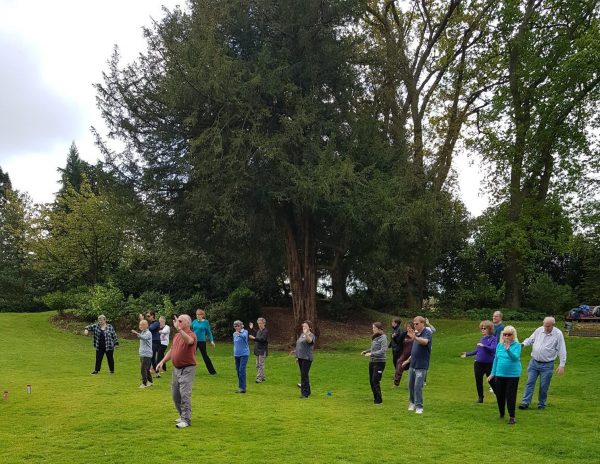
I am delighted to be teaching again in the Swiss Garden at Shuttleworth this summer – please see their website for further information and for bookings.
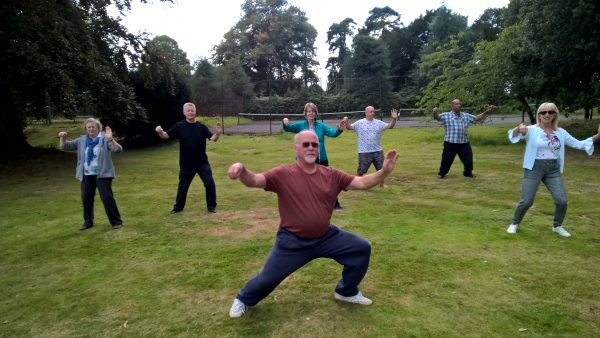
Given our “Road Map” out of Covid it seems possible, probably/maybe! to run our annual Belsey Bridge Tai Chi residential weekend this year. Fortunately, I have carried over our booking from last year covering Friday 10th to Sunday 12th September and would like to invite bookings, subject to Covid restrictions of course.
The format will be the same loose arrangement as previously with a basic program for everyone and specialist sessions to meet individual needs.
Cost as previously will be £320 pp for teaching over the weekend with full board and en-suite accommodation.
Please let me know if you would like to come.
Given the recent news of Covid restriction changes to come into effect on March 29 ( which do not seem to be conditioned at this point), I am planning, albeit tentatively, to restart group classes in the park at the STMA from Monday 29th as follows:
Monday at 10.00 am
Thursday at 10.00 am
Sunday at 10.00am
As before these will be free of charge, at least initially, to get us started back into group practice, although this may change.
The “Rule of Six” will of course apply until the government changes it and will be managed on a “first come, first served” basis.
Please continue to monitor this blog by registering for automatic updates.
Chen Xiaowang – Yifei Gong for Tai Chi
23/01/2021For people who are into Chi Gong ( chi kung) there are many “gongs” that can be learned and practised beneficially for loosening and energy balance. Unfortunately, many sets or their demonstrations, do not comply with the tai chi principles of movement – so it is great that Grandmaster Chen Xiaowang has produced this set called Yifei Gong which educates the body to move in a relaxed and connected way from the centre – how would it not? Yifei Gong is simple and easy to learn. it is a nice comfortable set of movements that can easily be practised each day by people of all ages – it can be viewed here on Master Chen’s website – good luck!

